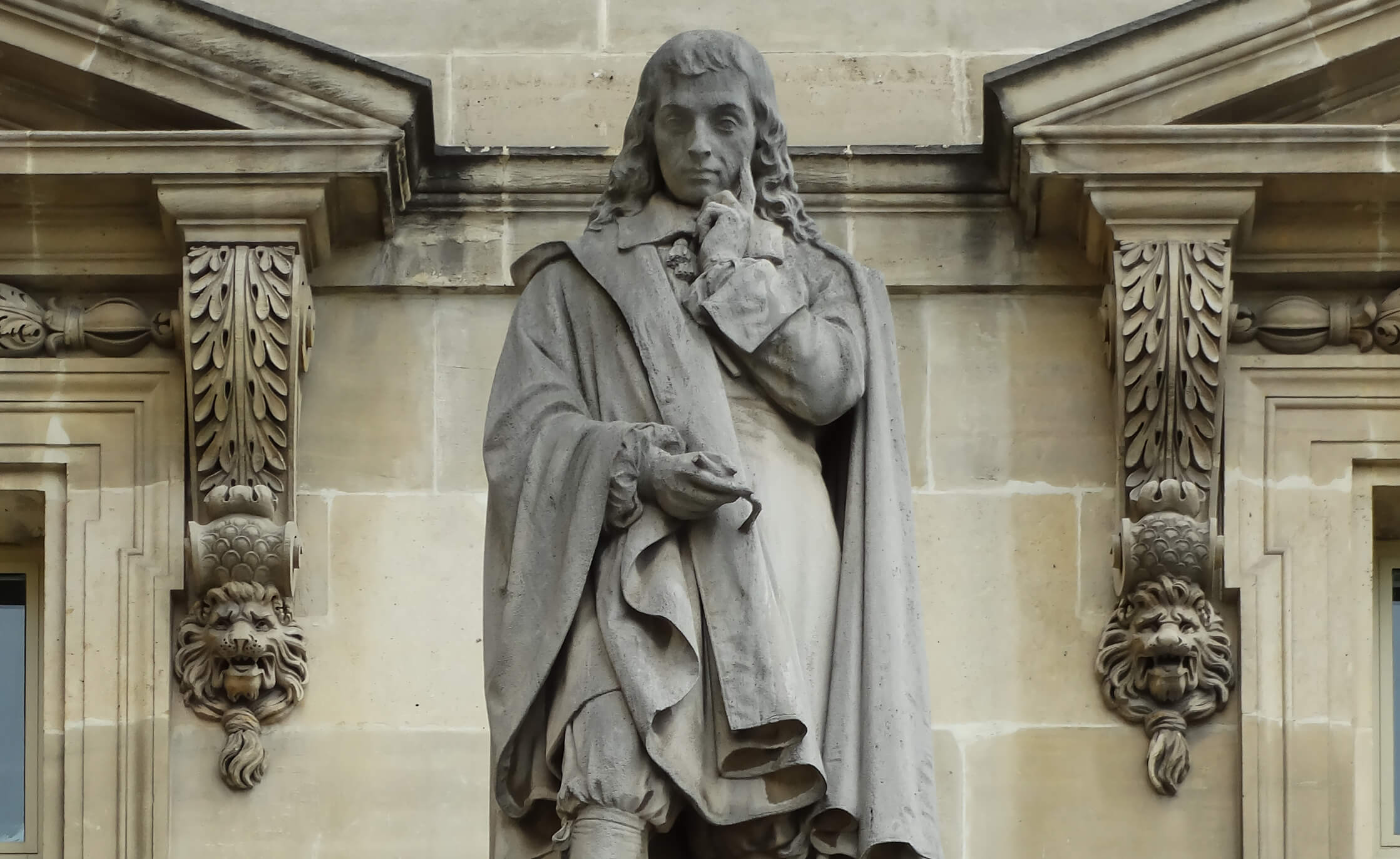Four centuries ago, on June 19, 1623, in Clermont-Ferrand, town in south-central France, was born a man who, according to his sister Gilberte, “has always had an admirable clarity of mind for discerning what is false”: Blaise Pascal († 1662).[1]
About this mathematician, inventor, theologian, attentive explorer of the human soul, detractor of the vices of arrogant rationalism, about the philosopher of the “bet” on God, on whom life is worth founding, about the thinker who reevaluates the “reasons” of the heart, Gilberte says well: her brother, in that sort of dialectic between scientific research and Christian adventure that characterizes his 39 years of life, has always fought for the truth. Concerning the first field we briefly recall his very precocious interest per Galileo Galilei († 1642) and in René Descartes († 1650); the invention of the pascaline, a calculating machine; the development of Evangelista Torricelli’s hypotheses († 1647) on empty space and the cult of science. As for Pascal’s religious adventure, which favors his more mature writings (including the famous Pensées, Thoughts), there are three decisive moments: the “bet” on God’s existence, the “night of fire,” and the death of him.
When the great thinker was thirty-one years old, the religious motive
is at work within him. He becomes uneasy. The realities which he sees, the values which he knows, and the problems which the known poses for him, are called into question. He feels that there is something higher. He feels himself drawn into the divine sphere. But this felling is not clear enough, not real enough to be a match for the other reality in this mind which so demands reality. A period of hard struggle begins, a period full of anguish, because what is pressing for recognition is still obscure and confused. The situation becomes both ever more profound and ever more difficult. His illness is also very oppressive. […] The crisis comes to its final climax and at the same time resolves itself in the event of the evening of November 23, 1654, in which God appears to Pascal as the reality of realities, in that it becomes clear to him who the living God is — distinct from man, distinct from nature. It is the event which find its expression in the Mémorial.[2]
And when he finally arrives at the encounter with Christ, Pascal comments in his thoughts:
Not only do we know God through Jesus Christ, but we only know ourselves through Jesus Christ; we only know life and death through Jesus Christ. Apart from Jesus Christ we cannot know the meaning of our life or our death, of God or of ourselves. Thus without Scripture, whose only object is Christ, we know nothing, and can see nothing but obscurity and confusion in the nature of God and in nature itself.[3]
But let’s leave these discussions to others and limit ourselves to music. Yes, because the English text of two Pensées, Pascal’s unfinished philosophical masterpiece, has become 2 Lieder nach Worten von Pascal (2 songs on Pascal’s words): Despite these miseries, man wishes to be happy and The only thing which consoles us.
The two pieces were written by Hanns Eisler [† 1962], who was an early pupil of the Austrian composer Arnold Schoenberg († 1951) and a lifelong friend of the German dramatist Bertolt Brecht († 1956), between September 12 and 14, 1942, while living in exile in Santa Monica near Hollywood in California.
The text says:
Despite these miseries, man wishes to be happy, and only wishes to be happy, and cannot wish not to be so. But how will he set about it? To be happy he would have to make himself immortal. But, not being able to do so, it has occurred to him to prevent himself from thinking of death.[4]
And again:
The only thing which consoles us for our miseries is diversion, and yet this is the greatest of our miseries. For it is this which principally hinders us from reflecting upon ourselves. Without this we should be in a state of weariness, and this weariness would spur us to seek a more solid means of escaping from it. But diversions amuse us and lead us unconsciously to death.[5]
They are two fragments that have diversion as their object, which Pascal, following the etymology of the term, considers a way for man to look away from what he does not want to look at. Pope Paul VI († 1978) also spoke about it when, urging his listeners to have good and restorative summer holidays, he discouraged them from what Pascal would call “divertissement, not in the sense of healthy and restful amusement, but in the sense of diversion from the real values of life and from the vital centers of conscience.”[6]
Pascal’s adventure still fascinates us today, perhaps because it makes us discover something about ourselves. The French writer François Mauriac († 1970) has no doubts about it when, at the end of his portrait of the French thinker, he presents him to us as
the brother of all sinners, of all converts, of all those disturbed by a spiritual wound which at any moment may bleed afresh. He is in the number of those whom Love has pursued from afar and whose only reliance is that Love.[7]
[1] G. PÉRIER, La vie de Monsieur Pascal, Amsterdam 1684, p. 5. Our translation.
[2] R. GUARDINI, Pascal for our time, Herder and Herder, New York 1966, p. 28.
[3] B. Pascal, Pensees, Penguin, New York 1995, no. 417/548.
[4] B. Pascal, Pensees, no. 17.
[5] Ibid., no. 18.
[6] PAUL VI, Angelus, July 26, 1970. Our translation.
[7] F. MAURIAC, Blaise Pascal e la sorella Jacqueline, Milano 1949, p. 177.


